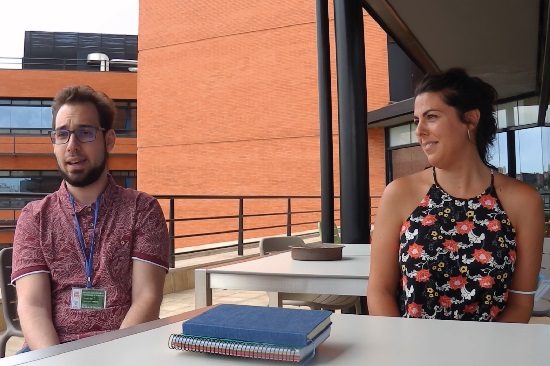
IATA has been gradually resuming its research activity in recent weeks. We have talked to the research staff to find out how they are returning to normal and how this break has affected their research projects.
This week we interviewed two representatives of IATA PhD students Laura Settier and Victor Silva.
The PhD is a decisive phase in the research career, these are years of hard work and effort. An average of 12 theses are defended at IATA each year. At present we have 27 doctoral students in the various research groups that have been affected by the break during the months of absolute confinement. Therefore, we wanted to know in a general way what this has meant for them. Each case is unique, but in general terms Laura Settier, who is in her last year of research in the Packaging group and Víctor Silva, in the post-harvest group, in his first year of a doctorate, tells us about it.
Question: What were you doing in the laboratory when the State of Alarm was decreed?
Laura: At the time the State of Alarm was declared I was trying to advance the experiment as much as possible to give me time to write before my thesis deadline. I had everything from bacteria growing on the stove to tubes to be scrubbed. In addition, I was tutoring a TFM girl who was with us for almost a month and a half and we had to stop suddenly without being able to finish the work as we would have liked.
Víctor: In my case, since I work with oranges, we had to stop the experiments because we couldn't take advantage of the harvesting campaign and will have to wait for next year's. On the other hand, I have been able to do some computer work from home and thanks to the people who have done on-line courses I have learned things that can be useful for my thesis.
Question: How has the time of confinement affected your thesis?
Víctor: We had four students and a JAE Intro scholarship who had to completely stop their activity because of the confinement, as well as a boy from Brazil who had a stay in the laboratory. I imagine that in other laboratories the situation will be similar
Laura: Well, at first there were moments of concern about the uncertainty that all this has generated... not only about how this situation would affect our work but also our life in general. When the quarantine began we were able to return to IATA to stop the ongoing experiments and to get what we needed to be able to work from home (including the computer).
In spite of the initial anguish and knowing that there is no time to lose, especially when one is seeing the end of the thesis, one must overcome the adversities and adapt. In my case, being in my last year, I had and still have a lot of computer work (writing outstanding articles, above all) so this has allowed me to advance on this side.
It is also important to point out that having to stop makes you take a distance and be able to sit down and analyze all the results you have and what is left to finish. All this is always more complicated when you are in the lab doing experimental work because there are always things to do.
Question: This SARS-CoV-2 pandemic has meant many changes at all levels, is there a problem with time or with the contracts or grants you have?
Victor: I haven't had any problems because I'm still in my first year, but I do know of other colleagues who have had problems extending their contracts.
Laura: From the PhD School, they have extended our time to deposit and/or defend so that these 3 months do not mean we have to ask for extensions. But in my case and in the case of most of my colleagues who are doing their thesis, the time for payment is not extended. Being towards the end of the thesis and taking into account what I have said before, more than a delay, this has meant that I have had to reverse the order in which I was planning to work.
Question: In general terms, what are the main concerns of doctoral students today?
Víctor: In my experience and from what I've spoken to people doing their doctorate, they are often related to anxiety, for example, which has been increased by the exceptionality of the pandemic. We are also concerned about other things such as competitiveness and, above all, what to do after reading the thesis.
Laura: In my opinion, the main concern of a PhD student, who is mainly finishing his thesis, is THE FUTURE. The future that seems distant when you start but slowly approaches. In general, what I think is most worrying is the uncertainty, having to make decisions such as whether to leave Spain, among other things, and also knowing (which is no secret) that, in science, contracts are generally quite precarious in terms of stability and salary. If to all this, which is the usual, we add a global health crisis that has led to an economic crisis and we do not know if there will be rallies next season ... well, what else can I add?
But, well, I'm sure the future will treat us well...
Link to watch the video interview

